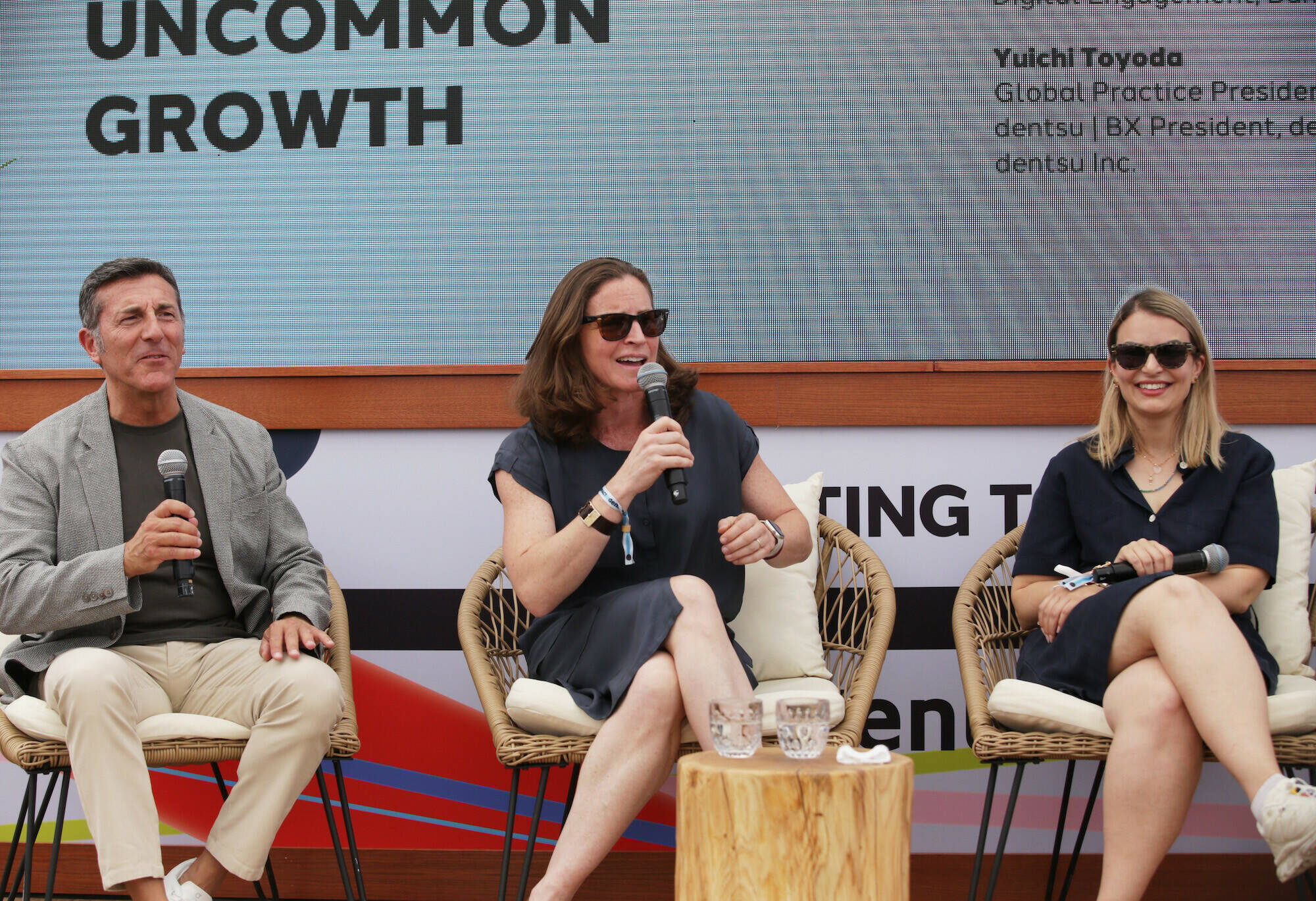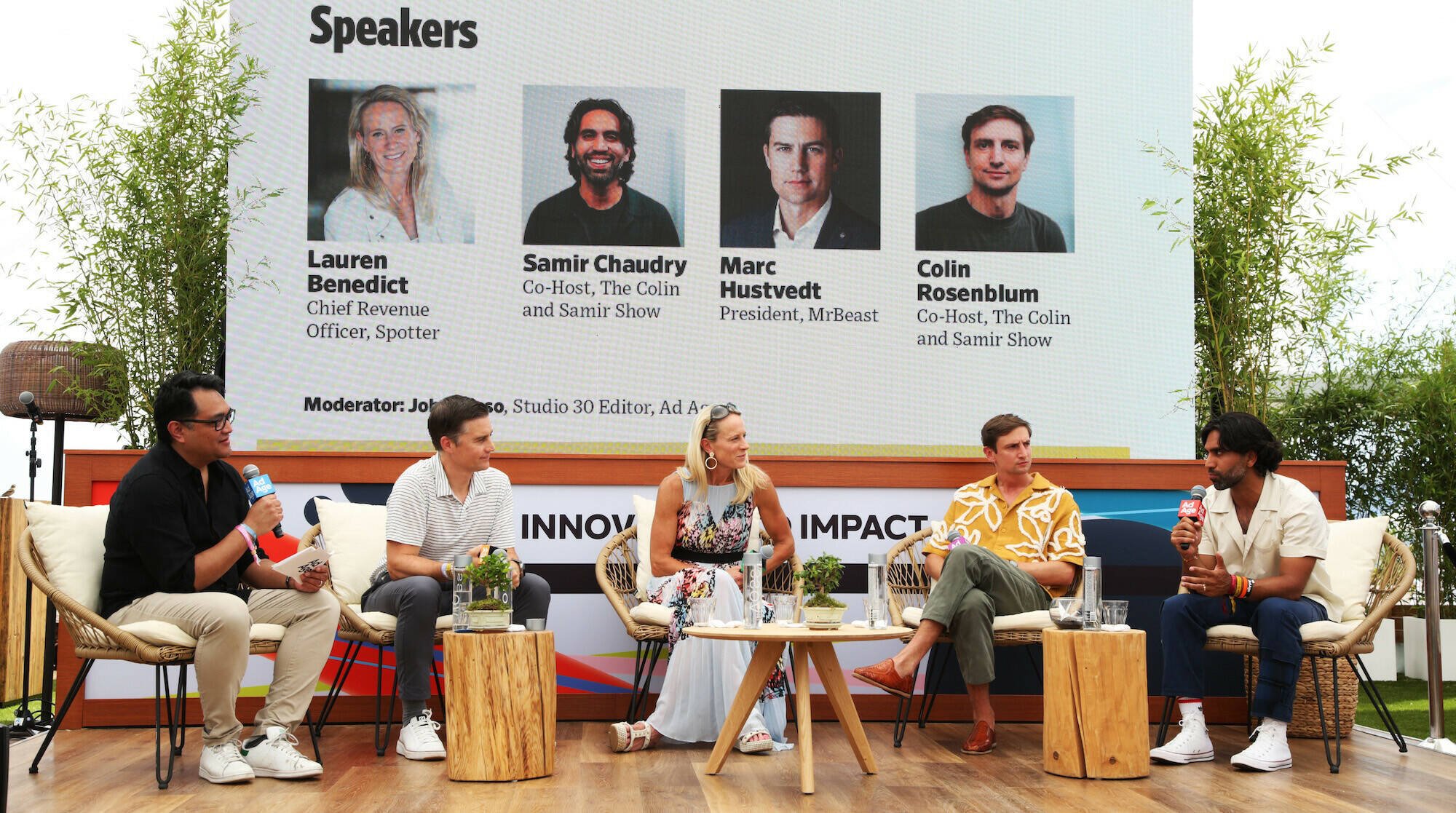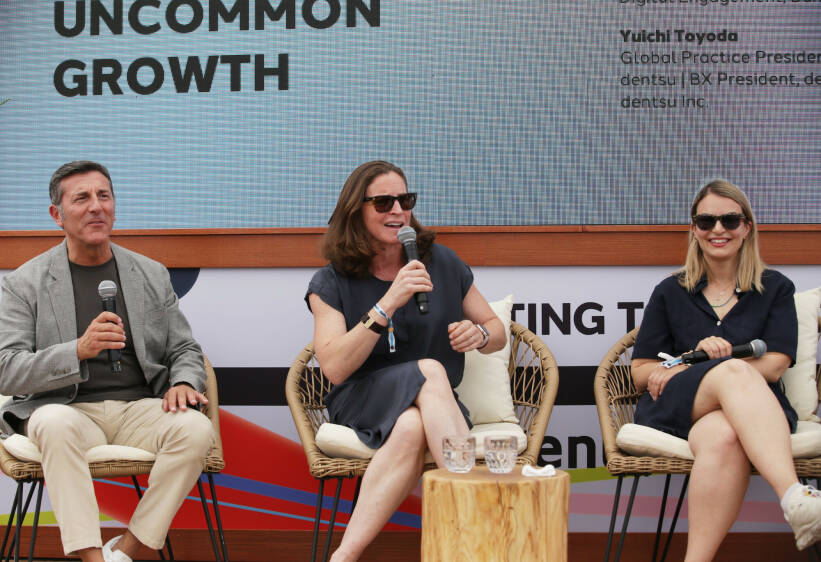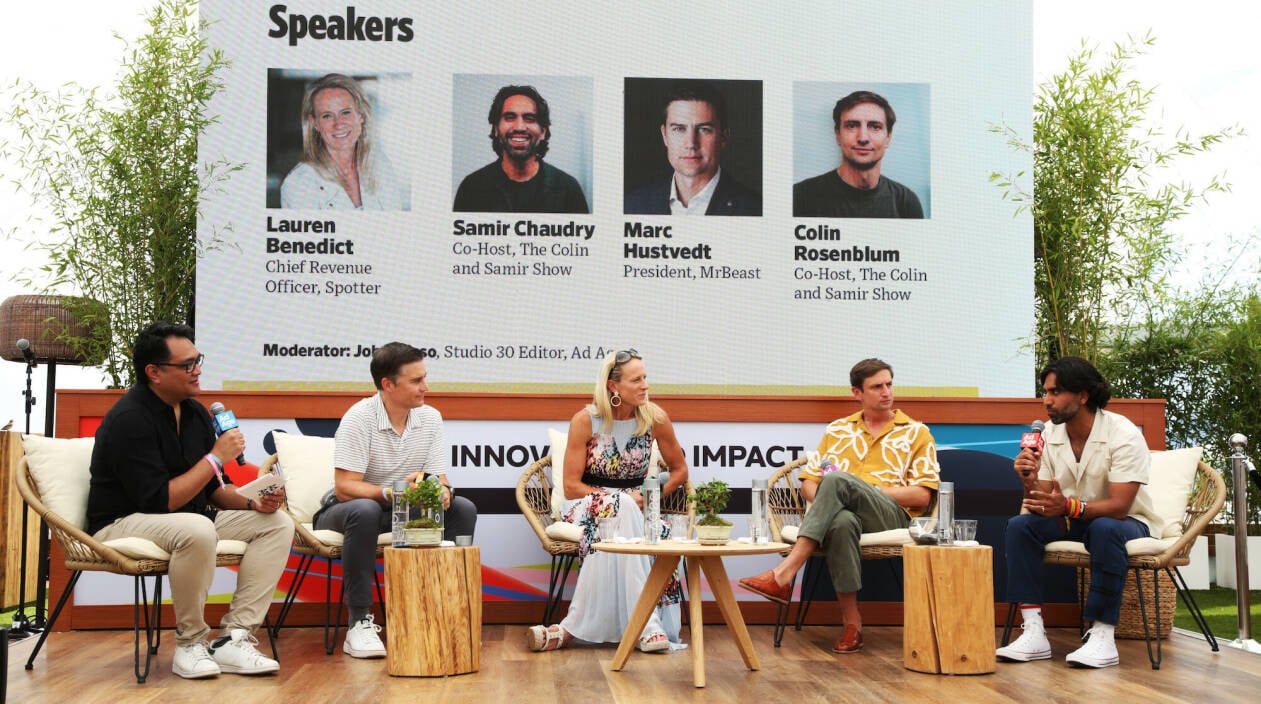
TUESDAY 18TH
DAILY RECAP
Human Creativity: A Matter of Time?
AI is the talk of the industry, and in most sessions at a festival of creativity such as Cannes Lions, the conversation around AI is framed in terms of scale, efficiency, and velocity coming to aid human creativity, rather than replacing it. What this means, in practical terms, is that, as an industry, we are using AI to make time – the time it takes to generate, produce, reproduce, modify, share, edit, publish, etc. – less of a constraint (and a cost) than ever before. Thus, the question begs to be asked: as AI becomes more widely adopted will the value of human creativity be found in a different relationship with time? AI can process a wealth of information that we are normally exposed to gradually, over the years in seconds. It can respond to a cue and generate a picture instantly. So, is time the key to the intangible quality that will continue to differentiate human insight and human craft?
On Tuesday afternoon, the ‘Mastering the Art of Long-Form Creativity: Lessons from the Big Screen’ session brought together creatives for a reflection on how more time allows the work to go deeper, reach an emotional crescendo, and establish stronger connections with the audience. It was remarked that ten years ago the expression “long-form content” was used to refer to 45 seconds-long commercials, while now it’s used to refer to three to five minutes-long ones. At the same time, AI will fuel the proliferation of assets that can be experienced in less than a second and allow small brands, or even independent creators, to compete with established brands for short-form ad spots on social platforms. Soon, we might witness a polarization in content where human creativity and craft are increasingly focused on long-form productions that allow for the time needed to manifest the quintessentially human qualities that enable us to unlock universal insights that define the human experience everywhere in the world.
Asif Kapadia, the Oscar and multi-award film director of documentaries like Senna and Amy remarked that our emotional investment is fundamentally tied to characters and drama that need time to develop a trajectory and go through an arc. We will likely see more brands lean into “long long long-form creativity” (a.k.a. feature-length movies) when they are looking to make something truly iconic vs. the scaled, functional creative they will leverage AI for daily. It’s not a coincidence that on Friday Lions will celebrate Mattel’s CEO Ynon Kreiz as the Entertainment Person of the Year for the impact the Barbie Movie made on culture this year.
However, human creativity is not necessarily always defined by having more time. As humans we have finite time, so what is quintessentially human often comes to life by assigning a different value to time. In his ‘Finding Creativity in Everyday’ keynote, Marc Pritchard, Chief Brand Officer, P&G remarked on the importance of finding moments that matter to the customers you serve, of finding how your brand matters in those moments, and of finding the magic to make those moments matter more. P&G’s ‘Wash Your Hands and Eat’ campaign for its Safeguard brand executed perfectly against all three principles Pritchard outlined.
The Rise of Women’s Football
On Tuesday morning, the Olympic Torch passed through the Croisette, while bars all over Cannes are broadcasting Euro 2024 games each evening throughout the week. However, we’ll likely see these sporting events impacting the work showcased at Lions only next year. This year, it’s all about the rise of women’s football. Orange’s ‘WoMen’s Football’ was awarded the Grand Prix in Sports and a Gold Lions in Entertainment for ‘tricking’ audiences into believing they were watching sensational skills from the men’s French national team through visual effects, to then reveal those skills were actually performed by the women’s national team. Nike’s ‘What the Football’ features an ‘early adopter’ father and daughter duo watching the U.S. women’s soccer team in the 90s. The father wakes up from a coma today to discover a new generation of international talents, presented as superheroes. This maneuver celebrates the incredible growth this discipline has experienced and why it’s worthy of everyone’s attention. ‘What the Football’ was awarded a Silver Lion in the Sports category. Perhaps the most touching and emotional example of work featuring women’s football (…emotional, so long-form content? Of course!) is WhatsApp’s ‘We Are Ayenda’, which was awarded the Grand Prix in Entertainment, as well as Golds in both the Sports and Entertainment categories. This documentary movie tells the story of the members of the Afghanistan Youth Women’s National Football Team and their struggle to escape their country as the Taliban claimed power in 2021 and banned women and girls from participating in sports (and the role Meta’s app played in enabling their escape).
Seeking the Partnership of Consumers
Another trend emerging in the work is brands leveraging consumers as partners in their activations: at times piggybacking on their established behaviors, at other times elevating them as protagonists of their narratives. Coca Cola was awarded Gold Lions in both the Industry Craft and Outdoors categories for ‘Thanks for Coke-Creating’, a campaign that reproduced in print and on actual coke cans the imitations of its logo that shop owners around the world have created to promote their businesses. Xbox was awarded the second ever Grand Prix in Gaming – this award was introduced at Lions last year – for ‘The Everyday Tactician’. The campaign involved getting a player of Football Manager - a popular football simulation game that doesn’t focus on maneuvering avatars for players but rather on administering a club’s finances, trading and signing players, and developing tactical solutions based on data sets that encapsulate players’ skills, performance, and fitness – hired as a tactician by an actual professional football club, Bromley F.C. to showcase the accuracy of the game’s simulation.





TUESDAY 18th
DAILY RECAP

Human Creativity: A Matter of Time?
AI is the talk of the industry, and in most sessions at a festival of creativity such as Cannes Lions, the conversation around AI is framed in terms of scale, efficiency, and velocity coming to aid human creativity, rather than replacing it. What this means, in practical terms, is that, as an industry, we are using AI to make time – the time it takes to generate, produce, reproduce, modify, share, edit, publish, etc. – less of a constraint (and a cost) than ever before. Thus, the question begs to be asked: as AI becomes more widely adopted will the value of human creativity be found in a different relationship with time? AI can process a wealth of information that we are normally exposed to gradually, over the years in seconds. It can respond to a cue and generate a picture instantly. So, is time the key to the intangible quality that will continue to differentiate human insight and human craft?
On Tuesday afternoon, the ‘Mastering the Art of Long-Form Creativity: Lessons from the Big Screen’ session brought together creatives for a reflection on how more time allows the work to go deeper, reach an emotional crescendo, and establish stronger connections with the audience. It was remarked that ten years ago the expression “long-form content” was used to refer to 45 seconds-long commercials, while now it’s used to refer to three to five minutes-long ones. At the same time, AI will fuel the proliferation of assets that can be experienced in less than a second and allow small brands, or even independent creators, to compete with established brands for short-form ad spots on social platforms. Soon, we might witness a polarization in content where human creativity and craft are increasingly focused on long-form productions that allow for the time needed to manifest the quintessentially human qualities that enable us to unlock universal insights that define the human experience everywhere in the world.

Asif Kapadia, the Oscar and multi-award film director of documentaries like Senna and Amy remarked that our emotional investment is fundamentally tied to characters and drama that need time to develop a trajectory and go through an arc. We will likely see more brands lean into “long long long-form creativity” (a.k.a. feature-length movies) when they are looking to make something truly iconic vs. the scaled, functional creative they will leverage AI for daily. It’s not a coincidence that on Friday Lions will celebrate Mattel’s CEO Ynon Kreiz as the Entertainment Person of the Year for the impact the Barbie Movie made on culture this year.
However, human creativity is not necessarily always defined by having more time. As humans we have finite time, so what is quintessentially human often comes to life by assigning a different value to time. In his ‘Finding Creativity in Everyday’ keynote, Marc Pritchard, Chief Brand Officer, P&G remarked on the importance of finding moments that matter to the customers you serve, of finding how your brand matters in those moments, and of finding the magic to make those moments matter more. P&G’s ‘Wash Your Hands and Eat’ campaign for its Safeguard brand executed perfectly against all three principles Pritchard outlined.
The Rise of Women’s Football
On Tuesday morning, the Olympic Torch passed through the Croisette, while bars all over Cannes are broadcasting Euro 2024 games each evening throughout the week. However, we’ll likely see these sporting events impacting the work showcased at Lions only next year. This year, it’s all about the rise of women’s football. Orange’s ‘WoMen’s Football’ was awarded the Grand Prix in Sports and a Gold Lions in Entertainment for ‘tricking’ audiences into believing they were watching sensational skills from the men’s French national team through visual effects, to then reveal those skills were actually performed by the women’s national team. Nike’s ‘What the Football’ features an ‘early adopter’ father and daughter duo watching the U.S. women’s soccer team in the 90s. The father wakes up from a coma today to discover a new generation of international talents, presented as superheroes. This maneuver celebrates the incredible growth this discipline has experienced and why it’s worthy of everyone’s attention. ‘What the Football’ was awarded a Silver Lion in the Sports category. Perhaps the most touching and emotional example of work featuring women’s football (…emotional, so long-form content? Of course!) is WhatsApp’s ‘We Are Ayenda’, which was awarded the Grand Prix in Entertainment, as well as Golds in both the Sports and Entertainment categories. This documentary movie tells the story of the members of the Afghanistan Youth Women’s National Football Team and their struggle to escape their country as the Taliban claimed power in 2021 and banned women and girls from participating in sports (and the role Meta’s app played in enabling their escape).
Seeking the Partnership of Consumers
Another trend emerging in the work is brands leveraging consumers as partners in their activations: at times piggybacking on their established behaviors, at other times elevating them as protagonists of their narratives. Coca Cola was awarded Gold Lions in both the Industry Craft and Outdoors categories for ‘Thanks for Coke-Creating’, a campaign that reproduced in print and on actual coke cans the imitations of its logo that shop owners around the world have created to promote their businesses. Xbox was awarded the second ever Grand Prix in Gaming – this award was introduced at Lions last year – for ‘The Everyday Tactician’. The campaign involved getting a player of Football Manager - a popular football simulation game that doesn’t focus on maneuvering avatars for players but rather on administering a club’s finances, trading and signing players, and developing tactical solutions based on data sets that encapsulate players’ skills, performance, and fitness – hired as a tactician by an actual professional football club, Bromley F.C. to showcase the accuracy of the game’s simulation.


